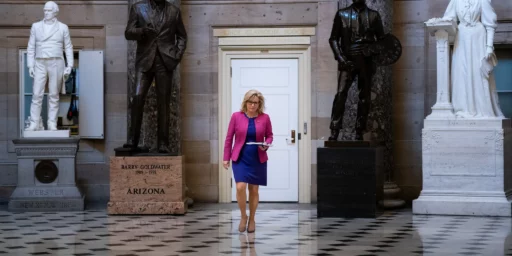Money and Intra-Party Competition
More in a series of ongoing observations about the GOP primaries.

To add to an ongoing set of posts that is likely to continue to grow, we are seeing further examples of Republican fissure around exactly how trumpy the candidates can/will/should be. In this case, we have examples from the Wyoming House contest and the open Alabama Senate contest. What struck me about these races, which each have their own unique characteristics, is the role being played by money and what that may tell us over the long haul.
The House race in Wyoming is, like the Alaska Senate primary, is a pure anti-Trump v. Trump situation insofar as it features incumbent Liz Cheney, who has been quite vocal in her critique of Trump as it pertains to the January 6th Insurrection. Fox News reports that she has already raised a considerable amount of money for her re-election campaign: Cheney fundraising surge continues, as Wyoming congresswoman sets second straight record.
Cheney’s 2022 reelection campaign hauled in $1.88 million in the April-June second quarter of fundraising, an increase from the record-setting $1.5 million Cheney brought in during the first three months of the year. Cheney for Wyoming shared the fundraising figures first with Fox News on Tuesday morning.
[…]
The campaign also highlighted that the congresswoman, the daughter of former Vice President Dick Cheney, has $2.85 million cash on hand as of the end of June, double the $1.43 million she had in her campaign coffers three months ago. Her money in the bank gives Cheney a significant fundraising advantage over any of the primary challengers seeking to oust her in 2022.
Money isn’t everything, but such numbers underscore the power of incumbency, her family’s role in the party, as well as her connection to the party establishment.
Her potential opponents for the nomination are less well-off financially, shall we say:
Wyoming state Sen. Anthony Bouchard, one of the better known of the Republicans challenging Cheney from the right, said a month ago that he had raised $500,000 since launching his campaign earlier in the year. Bouchard’s congressional bid hit a bump in May when he disclosed that when he was 18-years-old he got a 14-year-old girl pregnant.
Wyoming state Rep. Chuck Gray and lawyer Darin Smith are also among the seven candidates who are primary challenging Cheney. The challengers, touting their support for Trump, have embraced the former president’s unsubstantiated claims that the 2020 election was “rigged” and “stolen.”
Quite frankly, none of these appears to be high-quality opponents. This wouldn’t even be an issue worth noting save that the question will be: can Trump (and others in the national GOP who want to curry favor with Trump) overcome Cheney’s advantages to sway a primary electorate? It makes for an interesting case study, in any event.
A similar, but not identical, scenario is playing out in the Alabama GOP Senate contest to pick the candidate who will almost certainly replace Richard Shelby in the US Senate. The main contenders are Katie Britt, Shelby’s former chief of staff, US Representative Mo Brook of Alabama’s fifth district, and former Ambassador to Croatia Lynda Blanchard.
Britt has come out of the gate strong (via the Alabama Daily News):
U.S. Senate candidate Katie Britt raised $2.24 million in the first three weeks since she announced she’s seeking the office, her campaign said today.
Ninety percent of that total came from within the state.
[…]
According to Britt’s campaign, her June fundraising total is the most ever raised in a quarter by a Republican candidate for federal office in Alabama. She also set a state record for the most ever raised in a single month by any candidate, and did it in 21 days.
The former Business Council of Alabama leader’s total does not include any loans, self-funding or campaign-committee-to-campaign-committee transfers.
Brooks has not disclosed his fundraising totals as yet and Blanchard loaned her own campaign $5 million.
To be honest I do not think that Blanchard will be a big factor and the race will be between Britt and Brooks. Britt has serious organizational support from Shelby, and those fund-raising totals underscore that fact. And she is, as best as I can tell at this point, running a campaign that cleaves to trumpist themes without going full Trump (e.g., favoring CRT bans and further Covid lockdowns). However, Brooks, who spoke at the rally on 1/6 is rhetorically far, far the trumpier of the candidates.
Indeed, Trump has weighed in on the race already:
Trump, in a statement, said Britt, who formerly served as president of the Business Council of Alabama, is “not what Alabama wants” for the Senate.
“She is not in any way qualified and is certainly not what our country needs,” Trump’s statement continued. “For Mitch McConnell to be wasting money on her campaign is absolutely outrageous. Vote for Mo Brooks!”
So, we have in this race what will likely boil down to the well-funded, state party establishment’s preference in Britt and the Trump-endorsed, firebrand, Mo Brooks. Again: we will get to see what works with the primary electorate.
All of this, and the other posts I have written of late on this, all show the way in which the long-term shape of the parties is in the hands of primary voters and further shows how someone like Trump can influence a given party. And the current moment raises real natural experiments about factors such as name recognition, the role of money, and the power (or not) of endorsement by party leadership.
So, the saga continues.
Previous relevant posts:





I could certainly be wrong (and have only NASCAR-type interest), but it seems to me that having a bunch of wannabees all competing to be FG 2.0 will work in the favor of the reigning Queen Bee by splitting what might otherwise be a pretty unified vote for a new bee. (And I decided mid writing that I couldn’t resist the pun. 😉 )
I’ve commented before that I’d really like to know where Chuckles Koch and his co-conspirators are putting their money right now. But John Roberts seems determined to make sure I’ll never find out.
To my mind, these are beautiful developments.
With Alabama and Wyoming both sure-fire Republican keepers, the GOP primary will be the contest for the seat. And what will Britt and Cheney be doing with all their money? Bashing other Republicans with Trump on their tickets by proxy!!!
There are going to be a bunch of these contests going into 2022 – GOP against GOP in a battle for the soul of the party. In what were traditionally safe Republican seats – inexpensive to hold – the RNC is going to be spending huge amounts of money on intra-party squabbles. It’s money the party will no longer have to use against Democratic opponents elsewhere in the country.
@gVOR08: Wait a minute… Didn’t Anthony Kennedy say sunlight was the best regulation of dark money? (or something like that?)
I wouldn’t be surprised if some day money gets a direct vote.
While in some ways watching this play out will be an interesting and valuable test scenario to understand the role of money and institutions vs primary passion…I still wish they weren’t running the experiment real world on MY country.
@Kathy: I had an entertaining conversation with my father years ago about just buying a seat in government or even President and if it’s appropriate. While I initially recoiled in horror he noted that it was pretty much the way the Roman Republic worked for centuries, and might not be effectively that much different from today anyway. Just gets rid of the delusion (his term, not mine, though I can’t say he’s entirely wrong) that we actually have an informed electorate making reasonable choices, as opposed to low-information voters choosing what they see as the lesser of two evils after the candidates spend billions slagging each other. Have them pay the billions (win or lose) into the Treasury and while it won’t make a dent in the overall debt, its still a better use of the money than BS political advertising and deceptively named PAC’s hiding their donors and shelling out behind the scenes. Easier on the public too since we wouldn’t have to put up with all the ads. And can you really say our political leadership overall would be worse than the current system?
@Just Another Ex-Republican:
Not exactly. One did not buy a consulship, one bought votes among the electorate through patronage and alliances with other rich Romans, or secured the support of such.
During the Imperial era, post-Republic, one time, and one time only, the Praetorian Guard auctioned off the throne after killing the sitting emperor, Pertinax. The unlucky winner was one Didius Julianus, who was executed a bit over two months later.
@Scott F.: I’m confused as to why the RNC will be spending an inordinate amount of money on these primaries?